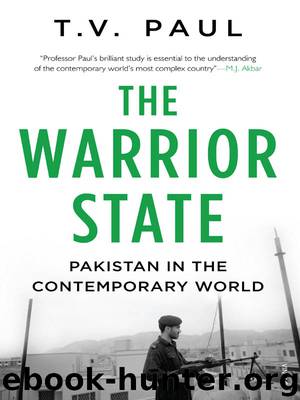The warrior State by War & Development

Author:War & Development
Language: eng
Format: epub
ISBN: 9788184006247
Publisher: Penguin Books Ltd
Published: 2014-03-17T00:00:00+00:00
Conclusions
The geostrategic prominence of Pakistan for the conflicts of the great powers and its alliance relationship with China and the United States has given the Pakistani elite an exaggerated view of its role and status in the world and what it can achieve geopolitically if it pursues crafty policies. The elite has also imbibed the notion of seeking geostrategic parity with India as the cornerstone of its national security strategy. Nuclear possession has enhanced strength to this conception. Added to this is the perception that Pakistan should be the bulwark for the protection of Islam in the world, as it was founded on the principle of the protection of Muslims. When such a world view persists, security is viewed as narrow military security and territorial security, and undermining the security of its neighbors, especially of India and Afghanistan, is viewed as justifiable. India’s often poorly crafted reactive policies, such as the Cold Start doctrine and its earlier pro-active military intervention in East Pakistan, have also contributed to this way of thinking in Islamabad. When its military or diplomatic efforts do not succeed, the Pakistani elite periodically attempted to engage in further coercive bargaining, encountering obstinacy and resistance on the part of India.
The basic problem is that the structural asymmetry with India cannot be easily bridged despite some factors in Pakistan’s favor. The competitive relationship with its neighbor creates intense warrior tendencies among the Pakistani elite. This has led the elite to adopt asymmetric war as a strategy to upset India and its national unity. The unwillingness to accept the territorial status quo also means that conflict becomes an inevitable dynamic in the South Asian milieu. Taking on a bigger power militarily also ensures the predominant role of the military in Pakistani society, while the structural dynamics of truncated asymmetry generate temptations to pursue an offensive military strategy. The prominence that China and the United States give to Islamabad also exaggerates Pakistan’s value for the global security order, creating a never-ending obsession with national security and hyper-realpolitik–oriented policies in that country. The financial and military support that the allies have provided allowed the Pakistani elite not to engage in any major structural change in the country’s economic or social system. This perceived geostrategic importance in reality has been a “curse” for Pakistan, preventing it from seeking more benign alternative security strategies or developmental paths to greater economic prosperity.
Download
This site does not store any files on its server. We only index and link to content provided by other sites. Please contact the content providers to delete copyright contents if any and email us, we'll remove relevant links or contents immediately.
Becoming by Michelle Obama(10026)
Beartown by Fredrik Backman(5751)
The Last Black Unicorn by Tiffany Haddish(5635)
Man's Search for Meaning by Viktor Frankl(4604)
The Book of Joy by Dalai Lama(3986)
The Five People You Meet in Heaven by Mitch Albom(3567)
In a Sunburned Country by Bill Bryson(3541)
The Choice by Edith Eva Eger(3468)
Full Circle by Michael Palin(3448)
The Mamba Mentality by Kobe Bryant(3276)
The Social Psychology of Inequality by Unknown(3029)
Imagine Me by Tahereh Mafi(2955)
Book of Life by Deborah Harkness(2937)
The Checklist Manifesto by Atul Gawande(2852)
Less by Andrew Sean Greer(2694)
A Burst of Light by Audre Lorde(2604)
The Big Twitch by Sean Dooley(2436)
No Room for Small Dreams by Shimon Peres(2368)
Everest the Cruel Way by Joe Tasker(2341)
